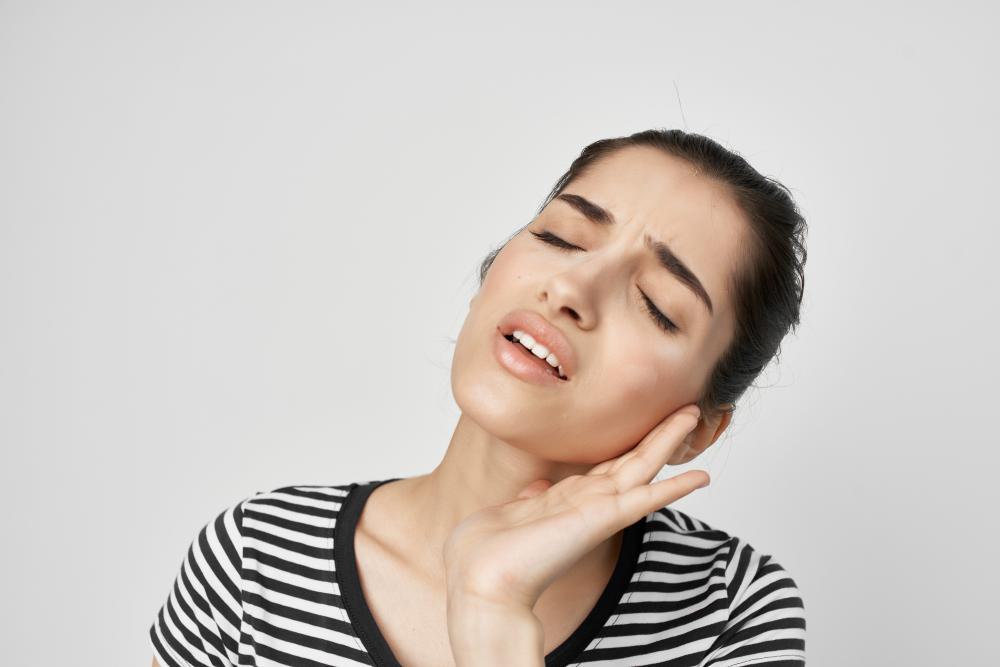Clenching In Sleep Westlake Village

Understanding Bruxism
Bruxism, the clinical term for teeth grinding and jaw clenching, is not just a habit but a condition that can have significant implications on one's oral and overall health. For many residing in Westlake Village, Clenching In Sleep Westlake Village may seem like a minor nuisance; however, it's a condition that requires attention and care. At our center, we've observed firsthand the effects bruxism can have, ranging from jaw pain to severe dental damage.
Several factors contribute to bruxism, including stress, anxiety, and sleep disorders. It's a complex condition that manifests differently in each individual, making personalized care essential.
Signs and Symptoms
Identifying bruxism early is crucial for effective management. Common indicators include flattened, chipped, or cracked teeth, heightened tooth sensitivity, and jaw pain or tiredness. Unfortunately, many may not realize they're bruxing as it often occurs during sleep, making regular dental check-ups vital.
Consequences of Untreated Bruxism
Ignoring signs of Clenching In Sleep Westlake Village can lead to chronic dental and muscular issues. Severe cases might lead to temporomandibular joint disorder (TMJD), a more serious condition affecting the jaw joint and surrounding muscles. It's an ailment we frequently manage at our center, offering relief and long-term solutions to those affected.
Moreover, continuous grinding can result in tooth damage, including fractures and loosening. The ripple effects extend to headaches, facial pain, and even changes in facial appearance.
A Holistic Approach to Bruxism
Personalized Treatment PlansOur center believes in a holistic approach to treating Clenching In Sleep Westlake Village. Recognizing that each case is unique, we devise personalized treatment plans that may include oral appliances, stress management strategies, and lifestyle adjustments. These plans aim to not only alleviate symptoms but also address the root cause of bruxism.
Integrating Traditional and Alternative TherapiesBeyond conventional treatments, we explore alternative therapies such as acupuncture, Oriental medicine, and Naturopathic guidance. Our experience has shown that integrating these modalities can significantly improve outcomes for our patients.
Patient Experiences
Our approach is patient-centered, focusing on comfort and clarity throughout the treatment process. Testimonials from those who've found relief from Clenching In Sleep Westlake Village at our center highlight not just the effectiveness of our treatments, but also the compassionate care they received. These stories inspire our team and reassure prospective patients of the potential for improvement and healing.
Commitment to Education
Education plays a pivotal role in managing bruxism. We strive to empower our patients with knowledge about their condition and the available treatment options. Through our podcasts and patient resources, individuals can gain insights into managing Clenching In Sleep Westlake Village, reducing its impact on their lives.
Understanding the connection between lifestyle choices and bruxism is also crucial. We encourage practices that promote overall well-being, such as mindfulness, regular exercise, and a balanced diet, as part of comprehensive care.
Accessibility and Support
Recognizing the barriers to accessing care, our center is dedicated to making our services as accessible as possible. With locations in Thousand Oaks and Brentwood, we cater to a wide area, ensuring more individuals can find relief from Clenching In Sleep Westlake Village. Additionally, we offer medical billing assistance and various financial options to ease the burden of treatment costs.
Prevention Strategies
While treatment is essential, prevention plays a key role in managing bruxism. Our center advocates for regular dental check-ups to detect signs early. We also stress the importance of stress management and relaxation techniques, which can significantly reduce the frequency and intensity of clenching episodes.
- Avoiding stimulants like caffeine and alcohol close to bedtime.
- Establishing a calming bedtime routine to improve sleep quality.
- Being mindful of jaw clenching during the day and practicing relaxation techniques to reduce tension.
Looking to the Future
As we continue to explore and understand more about Clenching In Sleep Westlake Village, our commitment to providing the highest level of care remains steadfast. Embracing new technologies, treatments, and research findings enables us to offer cutting-edge solutions to our patients.
The journey to managing bruxism is ongoing, and our center is here to support individuals every step of the way. By fostering a comprehensive and compassionate approach, we aim to not just treat bruxism, but improve our patients' overall quality of life.
For those struggling with Clenching In Sleep Westlake Village, know that you're not alone. With the right care and support, it's possible to alleviate the symptoms and reclaim your sleep and overall health. We invite you to reach out to us, explore our resources, and take the first step towards a brighter, healthier future.

Why have I been clenching my jaw in my sleep?
In our practice at TMJ & Sleep Therapy Centre, we've observed that jaw clenching during sleep, a condition known as sleep bruxism, often stems from a variety of sources. Common culprits include stress, anxiety, and certain sleep disorders such as sleep apnea. It's our body's natural response to stress - even when we're asleep, our subconscious mind can cause us to clench our jaws as a form of tension relief. Additionally, misalignment of teeth or an abnormal bite can also contribute to this condition. Our approach is to look at the whole picture, considering both physical and emotional factors, to identify the root cause of your bruxism.
What are 3 common causes of bruxism?
From our extensive experience at the centre, we've identified three primary factors that commonly contribute to bruxism: psychological stress, physical stress, and sleep disorders. Psychological stress, such as day-to-day worries or chronic anxiety, tends to be a leading factor. Physical stress, including an improper bite or misaligned teeth, puts undue pressure on the jaw muscles and joints, leading to clenching and grinding. Lastly, sleep disorders like obstructive sleep apnea often coexist with bruxism. Patients with sleep apnea tend to have more pronounced bruxism, likely as a physiological response to disrupted breathing during sleep.
How do I stop clenching my teeth at night?
At the TMJ & Sleep Therapy Centre, we advocate for a comprehensive approach to managing nighttime teeth clenching. First, incorporating stress-reduction techniques such as meditation, yoga, or deep breathing exercises can significantly help. Secondly, we often recommend the use of a custom-fitted oral appliance to protect the teeth and reduce the strain on the jaw during sleep. Lifestyle adjustments, like establishing a calming bedtime routine and limiting caffeine and alcohol intake in the evening, can also make a big difference. In some cases, addressing underlying issues such as sleep apnea with appropriate treatments can alleviate bruxism.
How I cured my bruxism?
While there's no one-size-fits-all cure for bruxism, personal experience and clinical observations have shown that a multifaceted treatment approach can lead to significant improvement. In my case, and in many of our patients' experiences, combining stress management techniques with professional dental care was key. Using a custom-made night guard prevented further dental damage and alleviated jaw tension. Additionally, practicing mindfulness and improving sleep hygiene contributed to reducing the frequency of my bruxism episodes. It's important to remember, successful management of bruxism often requires both addressing the symptoms and tackling the underlying causes.
How does integrating holistic treatment benefit those with bruxism?
At TMJ & Sleep Therapy Centre, our holistic approach to bruxism considers the interconnectedness of the body and mind. By integrating traditional dental treatments with alternative therapies such as acupuncture, naturopathy, and oriental medicine, we've observed a more profound and lasting relief in our patients. This comprehensive strategy not only addresses the physical manifestations of bruxism but also aims to tackle the root causes related to emotional stress and lifestyle factors. Patients often report not just a reduction in their bruxism symptoms, but also improvements in their overall well-being and quality of life.
What are effective prevention strategies for bruxism?
Preventing bruxism, especially for those at risk, involves a combination of proactive measures focused on reducing stress, safeguarding oral health, and improving sleep quality. Regular dental check-ups help in early detection and management. Stress-reduction techniques, such as mindfulness and yoga, coupled with lifestyle changes like reducing caffeine intake, can decrease the likelihood of clenching and grinding. Additionally, establishing a relaxing bedtime routine and ensuring a comfortable sleep environment can enhance sleep quality, potentially minimizing bruxism episodes. At our centre, we stress the importance of a holistic well-being approach as a cornerstone for prevention.
Resources
- Mayo Clinic - Bruxism: Mayo Clinic provides an overview of bruxism, including symptoms, causes, and treatment options.
- WebMD - Bruxism: WebMD offers information on teeth grinding, its effects, and potential treatment approaches.
- National Institute of Dental and Craniofacial Research - Bruxism: The NIDCR explores the impact of bruxism on dental health and provides research insights into the condition.
- Dentalcare.com - Bruxism Patient Materials: Dentalcare.com offers resources for patients dealing with bruxism, including educational materials and prevention strategies.
